High school dropout billionaire finds solace in golf and reading
Li Ka Shing—Hong Kong’s richest man & one of the world’s with a net worth of over
$34 billion in 2017—has one of the most inspiring rags to riches stories ending with an
unusual way of spreading his wealth.
Li, who continues to live a modest lifestyle even wearing just a $500 watch, publicly announced he’s giving away a third of his money to philanthropy for humanity’s sake.
“Despite my achievements, I can still remember poverty. I told my children and grandchildren that ‘The fruit that you eat will never taste as beautiful as the fruit that I ate during the turmoil of war. You will never cherish it as much as I do,’” he was quoted in the media.
The 89-year-old self-made billionaire has already changed and touched the lives of millions in Asia and across the globe through the Li Ka Shing Foundation with more than 120 million students educated and over 107 million patients served. Li is indeed leaving a legacy full of hope for those who need it the most.
“If you have done your best to make meaningful contributions, when it is time for you to go, all you will feel is a little tired, just like when the sun sets, you need to take a rest. I just hope that I lead a full life,” said Li.
The entrepreneur
Li, a high school dropout now owns one of the world’s leading container terminal and port services operators with holding interests in 52 ports in 26 countries, which is also into retail, energy, telecoms and real estate industries, the CK Hutchison Holdings Ltd. (formerly Hutchison Whampoa), listed in the Hong Kong Stock Exchange. In 2016, the company reported a turnover of $48 billion.
Li is also one of the first investors on Facebook buying $120 million worth of shares when it was just starting.
Born on July 29, 1928, his family was forced to leave their home in Chiu Chow in Guangzhou Province in the 1940s amid the Japanese invasion of China.
They fled to Hong Kong where his father later died of tuberculosis, leaving Li the responsibility of providing for their family before reaching the age of 15. He found a job in a plastics trading factory working for 16 hours a day.
Those days of hard labor ignited Li’s entrepreneurial spirit such that by 22, he had managed to set up his own business, the Cheung Kong Industries, through his meager savings and loans from relatives. Today, CK Group employs more than 300,000.
With the success of his plastic flowers factory, Li invested heavily in HK properties, expanding his business empire to real estate later listed and traded in the Hong Kong Stock Exchange in 1972.
Li continued expanding his business acquiring Hutchison Whampoa and Hong Kong Electric Holdings Limited (renamed Power Assets Holdings Limited) in 1979 and 1985, respectively.
Ernst & Young UK and the Times jointly named Li as the “Entrepreneur of the Millennium” at the turn of the century.
Staying Healthy
Despite his vast wealth, Li prefers to live a simple life. He lives in the same house with his two sons and their families. He says he remains physically fit through exercise, good sleep and golf.
The self-made billionaire philanthropist says he gets up every day before 6 am and plays golf for about an hour and a half—a routine more than a hobby.
“I wake up every day just before 6am and exercise and play golf for an hour and a half. I insist on reading before I go to bed at night. I am still energetic during the day. Your energy comes from being interested in your work,” Li was quoted in the media.
The Asian tycoon says he also walks on the treadmill at least 15 minutes a day at noon to stay healthy.
Li who loves flying and traveling also spends time seeing different destinations via his private jet, the Gulfstream G550, or cruising with his yacht.
“I wasn’t lucky. I worked hard to achieve the goals I set for myself,” Li said in one of his most famous quotes.
The total revenue passenger kilometers (RPKs) worldwide grew 6.8 percent in July raising the load factor for the month to 84.7 percent and indicating a strong global appetite for traveling despite economic uncertainties in many fronts.
The International Air Transport Association (IATA), which represents 275 airlines and more than 100,000 agents worldwide, posted the strongest growth in July with a 10.5 percent demand increase, raising its load factor to 84.9 percent.
“As is evidenced by the record high load factor in July, the appetite for air travel remains very strong. However, the stimulus effect of lower fares is softening in the face of rising cost inputs. This suggests a moderating in the supportive demand backdrop,” Alexandre de Juniac, IATA’s Director General and CEO, said in a statement.
European carriers also posted strong growth during the period at 7.5 percent jumping its load factor to 88.7 percent. Airlines in Asia-Pacific saw a 5.9 percent jump on passenger traffic in July but slightly lower compared to June’s record of 8.8 percent acceleration.
In the Middle East, carriers had a 4.5 percent increase in demand in July, up from 3.6 percent in June despite a slowdown on flights going to the US. “The Middle East to North America market has been affected by a combination of factors in 2017, including the recently-lifted cabin ban on large portable electronic devices, as well as a wider impact from the proposed travel bans to the US,” said IATA.
“Traffic growth on the Middle East-US route was already slowing in early 2017, in line with a moderation in the pace of expansion of nonstop services flown by the largest Middle Eastern airlines. July capacity climbed 3.6% compared to a year ago and load factor rose 0.7 percentage points to 81.5%,” it added.
Airlines from Africa experienced a 6.5 percent increase in traffic but still not enough to push for more profits as the region’s two largest economies—South Africa and Nigeria—continue to diverge amid recession and reduced business confidence.
In 2016, 3.8 billion passengers traveled and some 54.9 million tons of goods were shipped via airfreight.
IATA said the levels of profitability vary widely depending on the region but pointed out “North American airlines earned almost four times more per passenger than airlines in Asia-Pacific & Europe.”
De Juniac said Latin American and Middle East carriers “generated aggregate profits slightly better than break even, while African carriers remained in the red.” The industry raked in profits of $34.8 billion from revenues of $705 billion in 2016.
International Passenger Markets
“We are excited about our partnership with Liebherr as we continue to support Abu Dhabi and the UAE reach their visions. Our aim is to provide the best vehicles and technology to meet the needs of our client’s business. Nothing fits this description better than the Mercedes-Benz brand promise and EMC’s commitment to service excellence” -Bilal AlRibi, General Manager of EMC Daimler CV.
Known for durability, safety and state-of-the-art features, the Mercedes-Benz Actros trucks are a popular choice in the Middle East.
This year, the German-carmaker made another historic milestone when the Mercedes-Benz Trucks became the first manufacturer worldwide to get the new Active Brake Assist 4 (ABA 4) safety assistance system with pedestrian detection and Sideguard Assist for the Mercedes-Benz Actros on the road.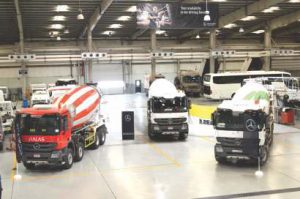
One of the first customers to put an Actros tractor unit on the road with the full safety pack (ABA 4 with pedestrian detection, Lane Keeping Assist, Proximity Control Assist, Attention Assist and driver’s airbag) and Sideguard Assist is SiloNet, a company based in Beckum and Sulingen, two towns in north-west Germany.
The business, established in 2015 as a 50:50 joint venture between haulage company Gerdes und Landwehr and Holcim Deutschland (Germany’s leading manufacturer of building materials), is using the Actros 1843 with silo semitrailer to transport cement, raw materials for cement and pulverised lignite, primarily on a regional basis.
On these transport routes containing a high proportion of urban area, the new safety systems provided by Mercedes-Benz Trucks can help to considerably reduce accident figures. The installation of active safety systems in the Actros models is correspondingly high.
Innovative partnership
Now an innovative alliance between the Abu Dhabi-based Emirates Motor Company (EMC) Daimler Commercial Vehicles and Liebherr will yield to 200 more of these heavy duty trucks on the roads of the United Arab Emirates.
The two companies recently formed a strategic partnership to supply 200 units of Mercedes-Benz Actros trucks with mixers to help firms across the UAE deliver on their infrastructural commitments to the growing landscape.
The partnership will comprise a supply of 200 Actros 8×4 with 12 CBM Liebherr Mixers, out of which 100 units will be supplied to one of the largest ready-mix companies in the UAE, the companies said in a joint statement.
Dubai, the tourism and financial hub of the UAE, is hosting World Expo 2020. This will run from October 20, 2020 through April 2021, and is projected to bring in at least 25 million tourists to the country.
The UAE government is investing more than Dh16 billion for new infrastructures in the staging of the world fair and in preparations leading up to the event. More than 270,000 new jobs will be created in the process.
Technically coordinated fit
The state-of-the-art technology will come with a ‘Connected Trucks’ concept where a unique Fleetboard system will be used for vehicle tracking and driver’s performance measurement. The combination of Mercedes chassis and Liebherr mixer bodies are a perfect technically coordinated fit and form reliable and high-quality truck mixer units.
EMC is the authorized Mercedes-Benz distributor in the Emirate of Abu Dhabi and the flagship company of ALFAHIM. It will supply top-of-the-line Mercedes-Benz commercial vehicles with a five-year extended warranty. Plus, a comprehensive repair and maintenance contract for five years will be included with full support all over the UAE.
Additionally, EMC will provide drivers’ training courses for enhanced safety on the road and economical driving techniques.
“We are excited about our partnership with Liebherr as we continue to support Abu Dhabi and the UAE reach their visions. Our aim is to provide the best vehicles and technology to meet the needs of our client’s business. Nothing fits this description better than the Mercedes-Benz brand promise and EMC’s commitment to service excellence,” said Bilal AlRibi, General Manager of EMC Daimler CV.
Liebherr has contributed significantly to the rapid expansion of the United Arab Emirates, and worked on various notable and high-profile projects.
“This strategic partnership with EMC aims to increase our existing mixers to address the growing demand in the infrastructural industry where comfort, economy, driving dynamics and variety are concerned. It is also the result of our business expansion strategy in this market,” said Liebherr’s Marketing & Sales Director Markus Mueller.
Egypt forecast the cargo volume at the airport to reach 800,000 tons or even 1 million tons by 2025
After the violent and tumultuous years that followed the Arab Revolutions in 2011, Egypt is back in full swing with its race to economic reforms.
The transcontinental country spanning between Africa, Asia and the Middle East remains struggling to have some sense of normalization on how to deal with its future development and crucial to this are entry points whereby free flow of trading goods and services can be achieved.
The new terminal at the Cairo International Airport’s Cairo Cargo City (CCC) offers a window of opportunity for Egypt to rebound with figures indicating the country’s agricultural products getting more in demand in Europe, the Middle East and Asia.
Egypt forecast the cargo volume at the airport to increase to 800,000 tons in 2025 or may even reach 1 million tons by then if the positive trend continues.
Cairo Airport Cargo Company (CACC), a private shareholding company which has been in the air freight industry since 1991, is among those strongly optimistic about the country’s future.
Positive signs
And all indications are there. Panalpina, a world leader in logistics and forwarding services, had chosen CACC’s terminal at CCC to establish its first country head office in Egypt in late 2016.
This year, CACC has been granted the license to operate a radioactive warehouse at CCC. Emirates SkyCargo also awarded CACC a multi-year agreement to provide cargo handling services to its 17 weekly flights to Cairo and to its one freighter per week route in the city.
In July 2017, the company also began providing tailor-made logistic solutions for all Saudia Cargo shipments bound for Egypt. Saudia Cargo operates about 20 flights per day to the country.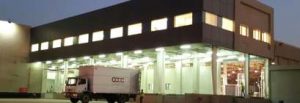
Apart from that, CACC continues its long-established partnership with major global carriers like Lufthansa Cargo AG, Qatar Airways, Etihad Airways, British Airways, Austrian Airlines, Aegean Airlines, Oman Air, DHL Aviation, Alitalia as well as various charter companies.
On August 7, the EU lifted the seven-year long ban on imports of Egyptian Arabian horses, enabling the Cairo International Airport to facilitate the shipment of eight live Egyptian horses to Frankfurt, Germany.
“We are honored to announce that this unique consignment was successfully handled at CACC new cargo terminal by the IATA certified CACC Live Animals Team. Upon their arrival to CACC export terminal three hours prior to flight departure, these unique beauties were delicately checked and carefully loaded into three horse containers/stalls to ensure maximum safety and comfort throughout the whole flight,” CACC said.
‘Egypt will recover’
Mahmud Ibrahim, managing director of CACC told Air Cargo Update in an interview in Paris where the company participated at the 28th Air Cargo Forum, their company has one of the biggest terminals in Africa and it was built on a vision that Egypt will once again become economically strong.
Ibrahim said 70 percent of Egypt’s exports are perishables and keeping this in mind, their company set up a warehouse with adequate space and temperature controlled facilities for items like fruits and vegetables.
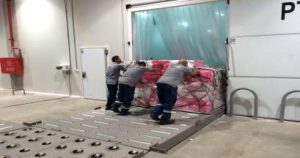 “In Egypt, the government is focusing to encourage export with good incentives. I believe in the coming years Egypt will have more market share in the export industry,” said Ibrahim who worked for Lufthansa in various top executive capacities before he was tapped to manage CACC. “Most perishables from Egypt go to Europe, Germany, London, other parts of the UK, in Arab countries like Saudi Arabia and the UAE.”
“In Egypt, the government is focusing to encourage export with good incentives. I believe in the coming years Egypt will have more market share in the export industry,” said Ibrahim who worked for Lufthansa in various top executive capacities before he was tapped to manage CACC. “Most perishables from Egypt go to Europe, Germany, London, other parts of the UK, in Arab countries like Saudi Arabia and the UAE.”
After Europe, China is fast becoming Egypt’s biggest trading partner with the volume of trade exchanges between them reaching $5.178 billion from January to June 2017.
Egypt’s exports to China year-on-year increased by 298.37 percent to reach $660 million while the Chinese exports to the country decreased by 20.79 percent to $4.518 billion.
Economic relations between the two countries are expected to flourish more with Egypt now part of the Silk Road Economic Belt trade union. At this year’s BRIC’s Summit, China pledged to invest $11.2 billion to Egypt’s economy.
“I’m very optimistic that Egypt will recover. This is my personal opinion,” the cargo executive added, noting that the country offers quality products and services but cheaper production and labor costs compared to others in the Arab world.
Egypt’s GDP is expected to grow by 3.9 percent this year, World Bank said, with private investments picking up in the second half of FY2017.
But the wealth gap remains wide with a significant percentage of Egypt’s more than 95 million people earning less than the equivalent of $2 a day.
changing the landscape for materials handling industry
Materials Handling Middle East 2017, the region’s dedicated trade fair for intralogistics, supply chain management, freight and cargo, will showcase how technology will drive the sector in the future with the emergence of Industry 4.0.
The Gulf Cooperation Council’s materials handling equipment market is estimated to grow 4 percent annually up to 2020 to reach revenues of between US$4.8 billion to US$5 billion, according to analyst Frost & Sullivan.
But the industry is forecast to undergo an evolution through the emergence of Industry 4.0—the merging of automation and data exchange in manufacturing technologies, combining cyber-physical systems, IoT (Internet of Things) and cloud computing.
State of flux
Frederic Zielinski, General Manager of Swisslog Middle East, said the logistics industry is in a state of flux, with new themes such as Industry 4.0, digitalisation, and constantly changing consumer buying habits demanding new concepts.
“Industry 4.0 has the potential to reshuffle the cards in how businesses operate,” said Zielinski. “With networked intelligence in manu-facturing and self-organising production processes, the ‘factory of the future’ will perform a quantum leap in productivity, flexibility, and efficiency.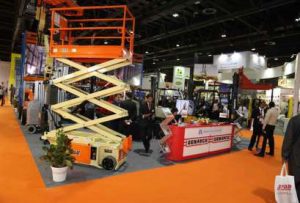
“The focus in the future will no longer be on the manufacturing process of purely mass-produced goods, but on the customised product manu-factured to industrial standards, and thus on customers’ requirements. This evolutionary step can only succeed, however, if we finally break down the barriers between the digital and real worlds.”
Added Zielinski: “At our Materials Handling Middle East booth, visitors will learn more about software and smart data we offer and experience the combination and simulation of innovative logistics systems that make the vision of a sophisticated high-tech warehouse a reality today. Warehouse management software will be the key in the age of Industry 4.0, so we’ll demonstrate our latest offerings in that direction as well.”
GENAVCO, one of the UAE’s leading suppliers of warehouse storage and material handling solutions, another exhibitor launching its end-to-end warehouse solution engineering capabilities during Materials Handling Middle East 2017, said the industry is adjusting with the changing times.
Neeraj Mahajan, the Director of GENAVCO, said material handling equipment represents an integral part of the supply chain of diverse industries for storage, control and movement of items – from the raw material stage to the distribution of finished products.
“The rising need for global production companies to automate operations and foster flow of goods in an efficient manner is the key force driving growth in the materials handling equipment market,” said Mahajan.
“The main challenge for customers in this region is to get a complete solution from a single source. They have to approach two or three companies for a complete warehouse solution. This process itself is time consuming and most of the time they are facing great difficulty to get an optimised solution meeting their needs.
“Here we play a vital role with our Warehouse Solution Engineering to overcome this challenge by offering end-to-end solutions. We design and develop custom made concepts as per customer requirements, so projects are delivered from one source and in the timeliest manner.”
Virtual Reality
More than 130 exhibitors from 21 countries representing 250 brands are participating at the biennial three-day event taking place from September 11-13, 2017 at the Dubai International Convention and Exhibition Centre.
Materials handling suppliers will turn to virtual reality 3D animation as educational tool for latest warehouse technologies.
Armed with HTC Vive Goggles, supply chain heads will experience how different technologies in fully automated warehouses such as robotics and Industry 4.0 can work together.
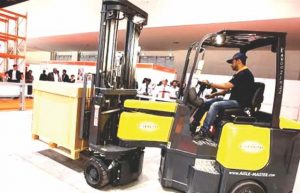 The Virtual Reality 3D warehouse animation will be showcased by Swisslog, one of the world’s leading suppliers of robot-based and data-driven intralogistics solutions.
The Virtual Reality 3D warehouse animation will be showcased by Swisslog, one of the world’s leading suppliers of robot-based and data-driven intralogistics solutions.
Daniel Hauser, Managing Director for Central Europe and the Middle East at Swisslog Warehouse & Distribution Solutions, said that while visitors can explore an automated warehouse in a fun way, they can also experience first-hand its unique benefits.
“Virtual Reality 3D warehouse animation will become a real service for customers in the future, and there are different ideas within Swisslog on how it can be deployed in the intralogistics world,” said Hauser.
“It can be used in sales to show buyers what their future systems would look like up and running on site, and it can be used to simulate systems to determine the optimal material flow or to observe performance during projected peak times. Another vision is to provide access and track live operations of any facility in the world, as well as play back historical data for error analyses,” he added.
Swisslog will also introduce its new AutoPiQsolution, a robot based automated picking solution for small items, ideal for e-commerce, pharmaceutical or spare parts logistics.
Other leading warehousing automation specialists such as Kardex, GreyOrange, SSI Schaefer, and Daifuku, the world’s largest materials handling systems supplier, are also preparing something unique for this year’s participants to the show.
Andrey Kras, Account Manager at Daifuku’s International Business Department, said the company also plans to use virtual reality at its booth so customers can visualise automated systems of their choice.
“The hotness of the automation topic in previous years was measured by the level of surprise and discoveries made by Middle East managers as to how automated equipment can benefit their businesses,” said Kras. “Now is the time to make business decisions & start buying new automated systems.
“Daifuku’s name is still unknown to many in the industry in this region, so raising brand awareness is one of our main goals at Materials Handling Middle East 2017. We plan to continue using our booth as an education platform with multiple teaching aids to get ideas of automation across.”
Ahmed Pauwels, CEO of Messe Frankfurt Middle East, the organiser of Materials Handling Middle East, said: “The influx of leading players to Materials Handling Middle East underlines the enormous potential of the region as a leading market for materials handling, warehousing and supply chain solutions. Te event will continue to be the place that hosts key business deals and where fruitful partnerships are forged.”
Materials Handling Middle East 2017 will feature the 2nd edition of the Supply Chain and Logistics Forum, an interactive summit bringing together regional industry professionals along with their international counterparts, government bodies, and policy makers to discuss key challenges and growth opportunities for logistics in the Middle East.
The event will also return with the highly popular Forklift Operator of the Year, a unique competition where the UAE’s most skilled forklift jockeys go head to head to be crowned the country’s most skilled, safest, and efficient forklift operator.
Hazardous materials, either in raw or finished form, require special people and skills to be transported and stored safely. It needs the science of chemical logistics which involves knowledge, experience and specialized equipment. These materials come in different forms—biological, chemical, radiological and/or physical, which have the potential to cause harm to humans, animals or the environment.
When left to untrained hands, transporting these materials can potentially result to explosion, ignition, emitting toxic gases, among others, that may cause serious health damages to humans who come in contact with them or even damage the environment.
Chemical logistics, thus, require unique shipping requirements because of the inherent danger and potential impact on health, security and the environment.
The global forecasted market of chemical logistics is all set to go up at a CAGR of 11.97% between 2016- 2020, according to Sandler Research.
Air Cargo Update got the opportunity to talk with Chemical logistics experts from Dupre Logistics, RSA-TALKE and Schmidt ME Logistics to discuss how to handle chemicals in a warehouse cautiously.
According to RSA-TALKE, the chemical industry in the Middle East is growing while other parts of the world are stagnating. Consequently, the region is preparing for the growth.
Dr. Wolfgang Hoppmann, CEO of Schmidt ME Logistics, said, “It is a fast growing market with many opportunities. New technologies create alternative handling methods, which are faster, safer and more cost effective than the current labor intensive methods currently used in the Middle East.”
RSA-TALKE stores and transports full range of chemical classes except explosives, radioactive material and infectious substances.
Schmidt ME Logistics transports all kinds of bulk chemicals, resin powder commodities as well as minerals, flour, rice, wheat and sugar.
Hazardous handling
Safety is a serious business for the chemicals industry. Because of this, companies in chemical logistics always make sure they are not spilled or tampered with during transit.
Those who handle hazardous loads must also be properly trained, certified and equip to understand all the safety requirements for the kind of products that they are shipping.
“All training is provided by in-house specialist focusing on safe working methods, no spill allowed and wearing the correct PPE. Our in house specialist has all been trained in Germany,” notes Dr. Hoppmann.
Markus Koepsel, General Manager, RSA-TALKE, said: “We use the behavior-based safety (BBS) approach. Training sessions based on this principle encourage employees to ‘think safety’ and to always actively seek it out from day to day. We also do chemical specific product handling training.”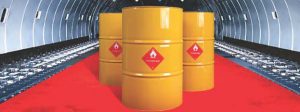
Mike Matte, Senior Director of Business Development, Dupré Logistics, notes, “Every team member is required to be trained and pass the curriculum testing in all aspects of company safety standards that meet and often exceed Federal Law (including drug and alcohol testing, chemical and hazmat materials handling, labeling and transport, and several other topics pertaining to the most rigorous safety expectations).
“Our HAZMAT and hazwaste drivers are certified and provided with ongoing training that meets and often exceeds government regulations to deliver the most hazardous materials safely”.
Chemical containment solutions
It takes great care to keep hazardous loads safe and secure, it requires specialized equipment to move any kind of chemical, hazardous or not. Different chemicals have different properties, needing it to match with the right container.
Schmidt ME Logistics only facilitates dry products, thus, liquids and gas are not part of its portfolio.
“We have multiple solutions in the UAE such as bulk container trucks, special liners for containers and have our own warehouses in Bahrain and Kizad AD which have specialised silos and warehouses to support. Here we also change large shipments into smaller loads as required by customers. These silos are also equipped with special duct filters to enhance the process,” said Dr. Wolfgang.
RSA-TALKE facilities have been designed to include containment systems: containment tanks, leakage trenches (to segregate the chemicals in the event of a spill).
“We also have special containment equipment depending on the packaging or product being handled like for IBCs, example over-drums,” Koepsel said.
RSA-TALKE handles the full customs clearance, and depending on the product special approval from various authorities may be sought, as theirs are one of the few authorized facilities designed to handle certain types of products.
Schmidt ME Logistics follows all rules and procedures as stipulated by the government, with a well-trained team, which specializes in all doctrines concerning mainland or free zone rules.
Handling challenging substances
RSA-TALKE facilities have been specially constructed to cope with hazards in the unlikely situation that there is an issue.
“Our experienced staff have also been trained to contain any waste. But more importantly, we take several precautions to prevent these situations from arising in the first place,” states Koepsel.
“We always want to contribute to raising the current standards for environmental safety in order to create a more sustainable working environment, which in turn will reduce the challenge of handling hazardous materials,” he added.
RSA-Talke’s general manager also noted their company has installed LEDs and sensors for energy saving and is also trying a pilot for solar paneling.
“We use ATEX certified equipment. Our fire fighting system is on par with NFPA standards,” he said.
Schmidt ME Logistics, meanwhile, said it handles chemicals using special bulk trailers and containers.
Shipping requirements
The key packaging methods and materials are always specified in the international acknowledged MSDS data sheets of the products.
Should the wrong packaging materials or methods be used, it can possibly lead to damages, or spills which could make the product a waste. This in turn will lead to environmental hazards and other pollution problems which are often difficult to clean up.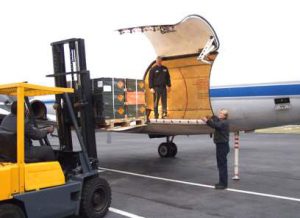
“Different materials have different rules and procedures. We take no short cuts and follow all rules and procedures as indicated by the government and the supplier of the products and more. In addition we ensure that all vehicles and equipment used are in perfect condition with regular checks and services. Each load is checked and documented and if any risk is identified the load is blocked,” says Schmidt’s CEO.
Material Safety Data Sheet (MSDS) needs to be analyzed and accordingly the right container is chosen for holding the product. Additionally, adequate packaging, load securement and correct material handling equipment are the main shipping requirements for RSA-TALKE.
Chemical transportation
RSA-TALKE follows Gulf SQAS standards for transportation. “We are also working on getting the ADR regulations in place for land transportation to raise the standards for chemical transportation by land. Both of these standards are being promoted by the GPCA and we are currently working on a task force with the GPCA for the same. For air and sea freight we are following IMDG and IATA regulations, respectively”.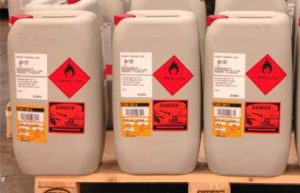
Dupré Logistics provides a variety of logistics and transportation services, as evidenced by its broad range of trailing equipment, including crude, chemical and gasoline tankers; dry and temperature-controlled vans; reefers; and flatbeds.
“Dupré designs a logistics solution that considers shippers’ various needs, and typically results in custom-building equipment for that application. When transporting chemicals we comply with all of the safety regulations set forth by the US government. Through our work with the Trucking Alliance we also work with other truckers to advocate for safer drivers and roads for our industry,” says Matte.
Safety procedures
Schmidt Logistics is fully ISO9001; ISO14001 and OHSAS 18001 compliant and conform to these rules and in some cases more.
RSA-TALKE has stringent HSSEQ standards that are international grade and the highest in the industry, as well as specialized infrastructure for maximum compliance.
With increased use of technology to follow shipments in transit, it is no longer a novelty for orders to be tracked from the time they are placed to the moment they are delivered. The sensitive nature of the materials being shipped makes robust tracking critical.
The benefits of adopting technology include the ability to automate freight execution and payment, receive notifications for important events along the way, and access centralized information, which facilitates tracking.
RSA-TALKE monitors chemical shipments against Gulf SQAS standards and some specialized internal programs that have been devised.
Schmidt ME Logistics uses GPS tracking on all its vehicles, with full checks before and after each load to ensure all equipment’s are in good condition.
“All our staff is issued with the correct safety gear and regular checks are done to ensure all procedures are correctly followed. Documents are also completed to monitor this,” he says.
Safety and adaptability
Schmidt ME Logistics uses warehouses and silos but it is to be noted that they mostly handle dry chemicals or powders only. For this kind of chemicals, there are specifics in terms of sprinkler systems, fire water containment, safety showers, and product containment regulations.
RSA-TALKE easily adjusts to shifts in the market by trying to act as partners to its customers, to help them anticipate industry trends and adapt accordingly to better deliver to their customer.
Schmidt ME Logistics has ample storage space to cope with fluctuations, either to carry excess stock to cover for shortages or have ample space to cover for low sales.
Challenges faced
Numerous challenges have prompted specialty chemicals manufacturers to seek help from third-party logistics providers (3PLs) in recent years
.
Greater supply chain complexity; the need to comply with ever-more stringent trade, security, and environmental regulations; changing patterns of production and consumption; and the continual drive to operate more productively and profitably are just a few of those challenges.
“There are many challenges but the solution has always been to have the correct equipment, facility and well-trained staff to handle any challenge,” concludes Dr . Wolfgang.
RSA-TALKE’s integrated chemical hub for liquid bulk transportation and storing is a unique solution in the region.
“Due to our specialized facilities and systems, we are the only authorized storer of laden tanks. We also leverage the expertise of our parent companies, RSA and TALKE, through which we create sophisticated solutions which cover all customer requirements, including bespoke transportation and storage solutions,” concludes Koepsel of RSA-TALKE.
Freightworks has a customer centric approach, a stable and highly experienced team, across all modes of logistic capability that can deliver excellent service for any requirement, big or small, one off or multiple complex moves.
Its history is as rich as the man who established it— Sir Maurice Flanagan— the founding CEO of Emirates whom the Dubai govern-ment hired and entrusted to help form the airline in 1985 with just US$10 million in startup capital and two leased planes but is today the Middle East’s largest carrier.
Just like Emirates, Freightworks has withstood time since it was formed in 1976, turned into a limited liability corporation in 1996 & a shareholder joint venture in 2000 between Emirates/dnata, the largest supplier of air travels services in the Middle East and Kanoo Group, a diversified business conglomerate mainly engaged in shipping and trading.
“The partnership has developed to meet the ever-growing market demands for freight transportation and help facilitate trading across the region and globally. Our shareholders have provided good support for Freightworks and through this, we have both Emirates Airlines and Kanoo Shipping as key customers,” Sean Bradley, Managing Director of Freightworks, told Air Cargo Update.
“We continue to work with all related companies and will expand beyond the United Arab Emirates whilst developing a larger business in the UAE,” he added.
Seamless integration
In a highly competitive industry like air freight and logistics, experience alone would not sail you that far. It’s a combination of acute business acumen, agility, reputation, technology, knowledge and flexibility to handle any situation that demands skills and good results.
Freightworks has successfully transitioned itself to meet all these challenges, operating in four key areas: supply chain, projects, removals and event logistics.
“We provide seamless integration of various transportation modes such as sea freight, airfreight and road freight, as well as diversified logistics services in warehousing, material handling, packaging, removals and event logistics. Freightworks has a long history of dealing with a wide variety of jobs, locally and globally,” explained Bradley, a veteran in the industry whose career portfolio includes successfully delivering a 30-month long global project for the development and management of the Volvo Ocean Race 2014-2015 in his capacity as Commercial Director for the Official Logistics Supplier.
Over the past four decades, Freightworks had accumulated vast and unique projects spanning across continents.
“We have developed a very strong reputation for the quality of our service. We offer a complete range of transportation & logistics services on a 24/7 basis, providing solutions to our clients and peace of mind. We build strong working relationships through regular face to face meetings, acting and working on our client’s needs,” Bradley proudly says.
For instance, Bradley shared the company was once tasked to ship specially designed furniture from the US and Italy to Qatar “to furnish the Royal Air Terminal in Doha.”
From luxurious furniture, it went on to deliver “king and queen crocodiles from Australia to Dubai Aquarium & Underwater Zoo.”
Then, on to 95×40 trailers from Jebel Ali to Jordan by road on behalf of UNHCR, among other clients; as well as moving Emirates Airlines materials each time it opens a new station anywhere in the world.
“’Big enough to deliver and small enough to care’” comes to mind,” said Bradley when asked about the company’s edge over its competitors. “Freightworks has a customer centric approach, a stable and highly experienced team across all modes of logistic capability that can deliver excellent service for any requirement, big or small, one off or multiple complex moves.”
That dependability and reliability have stuck to Freightworks’ name earning the trust of some of the biggest companies in the region like Dubai Duty Free, Carrefour, Emaar, Landmark Groups, Air France, among others.
“In the retail market, we work with the biggest names in the region such as Emaar, Carrefour, Landmark Groups and Dubai Duty Free. In terms of electronics, we proudly work with the likes of JVC and Samsung and within the aviation sector we work with some of the biggest players such as Emirates Airlines and Air France,” said Bradley.
“Emirates Airline is our biggest client, we warehouse and distribute inflight catering items and beverages for use on-board the aircraft. Freightworks is the preferred company for Emirates Group staff who join or leave the company for the movement of their personal effects worldwide,” he noted.
Investing in the future
Operating across five locations in the UAE, Freightworks is carefully handled by highly-trained 300 plus employees who constantly undergo training and continuing education to keep up with the changing industry trends.
Apart from investing on workforce, the company also puts high stakes on facilities and technology, a boon in this day and age.
“The company’s storage facilities feature the most sophisticated technologies available in the industry and cover a total of 17,000 sq. mtr. We have a large fleet of vehicles of all sizes including temperature controlled trucks, 40 ft. flatbeds, container haulage and roller bed trucks. We invest in new technology to improve our efficiency and provide an ever improving experience to our clients,” said Bradley.
“Staff training is carried out on a consistent basis, is needs based and we apply the usual HR practices to identify skill gaps and appraisals to develop staff for specific roles and succession planning. The key Freightworks premises are audited to the highest international standards for safety and compliance through TAPA and dnata safety groups,” he continued.
Freightworks’ warehouse facilities have 24,900 pallet locations, 19 loading bays, 2,000 sqm area of temperature controlled storage, a bonded customs area and a 5000 sqm lay down yard.
Tough as it may—the company’s team work makes it easier for Freightworks to accomplish its tasks no matter the odds.
“Team work,” Bradley said when asked about the top business philosophy that fuels their success. “Our staff keep Freightworks moving forward, we invest in our employees to ensure they are the best in the business.”
“In addition, despite the volatile environment we strive to be the best we can in the fields we operate in. We take safety, ethics, impartiality and compliance extremely seriously, so that we hit the highest possible global standards, this helps to differentiate us in this highly competitive market.”
Growing market
Despite uncertainties in the Middle East, business analysts continue to see growth in supply and demand in various sectors in the region, particularly in terms of food and technology.
The UAE continues to be the region’s main logistics hub but other GCC countries are fast moving to compete in this area. In the post-oil era, Saudi Arabia is reportedly pumping as much as US$8 billion to build the Prince Abdul Aziz bin Mousaed Economic City, envisioned to be a futuristic warehousing and logistics hub.
Egypt is also beefing up its cargo facilities in anticipation of more business in the region. According to the International Air Transportation Authority (IATA), global cargo demand this year is projected to rise by 7.5 percent to reach 58.2 million tons.
Bradley described the UAE air freight and logistics industry as “Volatile, exciting, ever changing, demanding, extremely competitive, price sensitive.”
But he firmly believes a company that diligently does its part will succeed.
“With tenacity, hard work and consistency, focusing on the client and building an open working relationship, you have the opportunity to create a competitive advantage and develop a good business in the long term,” he said.
When asked about his forecast on the future of the freight and logistics sector in the UAE, Bradley said: “I think that oil and gas related work will remain static for some time, construction, hospitality and tourism sectors will improve in the short term. We are seeing continued investment in the aviation supply chain even though the industry is going through a difficult time so I think that industry will also develop.”
“Airfreight imports, exports and transshipments will remain steady despite cheap rates in some sectors being driven down by integrator freighter pricing, which is driving the 100+kg market down. Finally, I think that supply chain development in the UAE will continue to go from strength to strength, seeing investments by global key players in the market is evidence of the confidence in this market and region,” he further noted.
And just like others in the industry, he has high hopes of welcoming the FIATA Freight Forwarding Congress in the UAE as it hosts the World Expo 2020.
The UAE’s National Association of Freight and Logistics (NAFL) is bidding to host the event for the second time to coincide with Expo 2020, which is expected to generate as much as 20 million tourists until the global event wraps up in April 2021.
“It is testament to the NAFL and the very active current President Nadia Abdul Aziz that such developments are happening. I applaud their efforts and activities. It is a great body to represent our industry. Having the 2020 Congress in the UAE in the year of Expo would be great for the industry and an added bonus for highlighting the attraction of the region to business around the globe,” Bradley concluded.